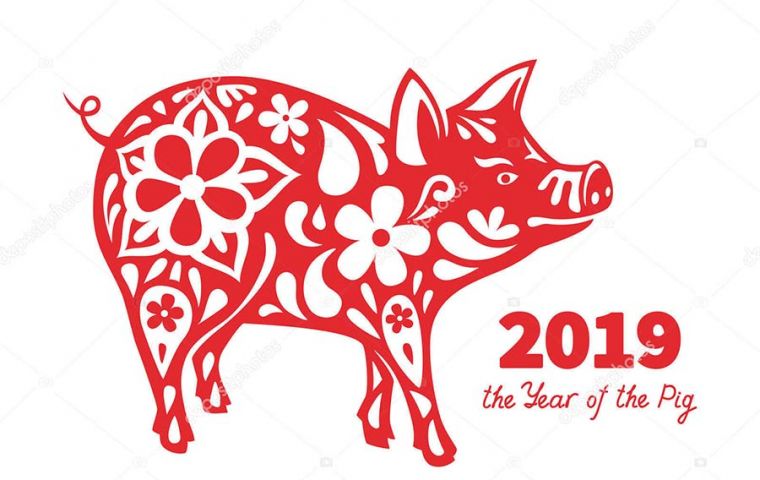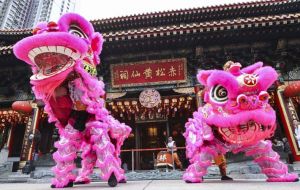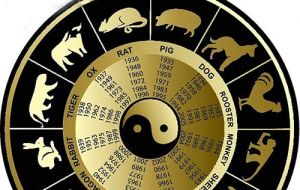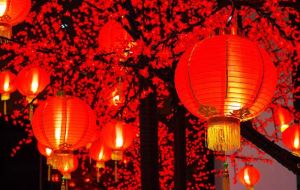MercoPress. South Atlantic News Agency
China celebrates on Tuesday 5 February, Lunar New Year, identified as the Year of the Pig
 The Chinese zodiac gives each year an animal sign and 2019 is the Year of the Pig. For Chinese people, years begin at Chinese New Year, rather than January 1!
The Chinese zodiac gives each year an animal sign and 2019 is the Year of the Pig. For Chinese people, years begin at Chinese New Year, rather than January 1!  On New Year's Day, traditional performances can be seen: dragon dances, lion dances, and imperial performances like an emperor's wedding
On New Year's Day, traditional performances can be seen: dragon dances, lion dances, and imperial performances like an emperor's wedding  Pig is the twelfth in the 12-year cycle of Chinese zodiac sign. Pig is not thought to be a smart animal in China. It likes sleeping and eating and becomes fat.
Pig is the twelfth in the 12-year cycle of Chinese zodiac sign. Pig is not thought to be a smart animal in China. It likes sleeping and eating and becomes fat.  Red Chinese lanterns hang in streets; red couplets are pasted on doors; banks and official buildings are decorated with red New Year pictures depicting prosperity
Red Chinese lanterns hang in streets; red couplets are pasted on doors; banks and official buildings are decorated with red New Year pictures depicting prosperity Chinese New Year or 'Spring Festival' is China's most important festival and holiday time. Chinese New Year 2019 falls on Tuesday, February 5, 2019, beginning a year of the Pig. China's public holiday will be February 4–10, 2019.
Chinese New Year has a varying date in the period January 21 to February 20. Chinese New Year falls on Tuesday, February 5 in 2019, and on Saturday, January 25 in 2020.
It's Lunar New Year, day 1 of China’s lunar calendar, which is within a day of the second new moon before the spring equinox moon phase. It's oddly called Spring Festival, with it being in winter for most of China, but that's because it “looks forward to spring”.
The Chinese zodiac gives each year an animal sign and 2019 is the Year of the Pig. In popular Chinese astrology Chinese New Year is important... For Chinese people, years begin at Chinese New Year, rather than January 1!
2018: It's Dog year 2018 until February 4th 2019 (Chinese New Year's Eve); 2019: A year of the Pig will start on February 5th.; 2020: A year of the Rat will start on January 25th.
Year of the Pig. ... Pig is the twelfth in the 12-year cycle of Chinese zodiac sign. The Years of the Pig include 1923, 1935, 1947, 1959, 1971, 1983, 1995, 2007, 2019, 2031, 2043... Pig is not thought to be a smart animal in China. It likes sleeping and eating and becomes fat.
The main Chinese New Year activities include 1) putting up decorations, 2) eating reunion dinner with family on New Year's Eve, 3) firecrackers and fireworks, and 4) giving red envelopes and other gifts.
Public celebrations: In many Chinese cities, and overseas communities from New Year's Day, traditional performances can be seen: dragon dances, lion dances, and imperial performances like an emperor's wedding. A great variety of traditional Chinese products are on offer, and rarely seen Chinese snacks. City parks and temple fairs are the places to go for this.
Every street, building, and house where Spring Festival is celebrated is decorated with red. Red is the main color for the festival, as red is believed to be an auspicious color. Red Chinese lanterns hang in streets; red couplets are pasted on doors; banks and official buildings are decorated with red New Year pictures depicting images of prosperity.
Most public decoration is done a month before, but home decoration is traditionally done on Chinese New Year's Eve. As 2019 will be a year of the Pig, decorations related to pigs will be commonly seen. Look out for red pig dolls for children and New Year paintings with pigs on.
Chinese New Year is a time for families to be together. Wherever they are, people are expected to be home to celebrate the festival with their families.The New Year's Eve dinner is called 'reunion dinner', and is believed to be the most important meal of the year.
Like people waiting in New York Time Square to see the ball dropping, Chinese people have the custom of staying up late on Chinese New Year's Eve to welcome the new year's arrival. After reunion dinner, families normally sit together to watch the Spring Festival Gala, one of the most watched TV shows in China. At the same time, most people send WeChat red envelopes or short messages to acquaintances by phone.
It has long been a Chinese tradition to set off firecrackers from the first minute of their new year. Fireworks have increasingly been added to the cacophony. From public displays in major cities to millions of private celebrations in China's rural areas, setting off firecrackers and fireworks is an indispensable festivity. Billions of fireworks go up in China at 12am Chinese New Year, the most anywhere at any time of year.
Like at Christmas in other countries, people exchange gifts during the Spring Festival. In rural areas and for older people traditions still strong, but increasingly younger people prefer just to receive red envelopes (by hand or electronically).
The most common New Year gifts are red envelopes. Red envelopes have money in, and are believed to bring good luck because they are red. They are given to children and retirees. Customarily only employers give red envelopes to working adults. See more on red envelopes.
Food for the New Year emphasizes lucky symbolic meanings such as fish, which sounds like the Chinese word for 'surplus'. These foods are eaten during the 16-day festive season, and particularly for the New Year's Eve family reunion dinner. The luckiest Chinese New Year foods (and their symbolic meanings) are: Fish (an increase in prosperity); Chinese dumplings (great wealth); Glutinous rice cake (a higher income or position).
The festival has a history of over 3,000 years. Celebrations on lunar New Year's Day can be dated back to the ancient worship of heaven and earth. Over the centuries new traditions were added and celebrations became more entertainment-orientated. Read more on Chinese New Year History.
In 1967 food was rationed, and there was no money! Greetings were full of Communist fervor. Now people eat out for Chinese New Year, send e-money, and greet with instant messages on WeChat (the most popular app in China).




Top Comments
Disclaimer & comment rules-

Read all commentsBrazil should celebrate it too:
Feb 13th, 2019 - 09:58 am 0https://jornalorebate.com.br/13810-matematicamente-insustentavel#
Commenting for this story is now closed.
If you have a Facebook account, become a fan and comment on our Facebook Page!